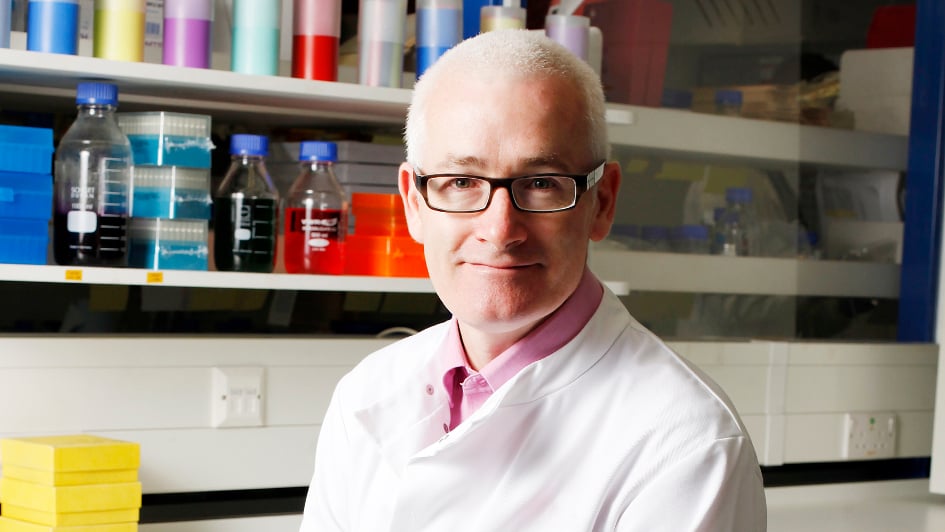Our healthy tissues depend on an exquisite choreography of cells dividing, differentiating and dying – all conducted by genetic networks, signalling pathways and epigenetic effects. And when this fine balance is tipped, we enter into diseased states, including cancer. One of the crucial signalling networks that often go awry in cancer are those that respond to DNA damage and regulate the cell cycle progression. But now researchers are turning this to their advantage, and are attacking cancer by targeting one of the very processes that drives it – a faulty DNA repair response.
Radiotherapy generally uses high-energy X-rays of a few million electron volts targeted to the tumour in order to break double-stranded DNA – damaging tumour cells beyond repair. Double-stranded breaks, like those inflicted by radiation therapy, kick start a DNA damage signalling cascade involving the proteins ATM, Chk2 and p53. These stop the cell cycle at a checkpoint where the cell pauses to inspect its genome – G1/S – and corrects any mistakes before entering DNA synthesis. If the cell detects single-stranded breaks in the DNA, an alternative pathway is activated which involves the proteins ATR, Chk1 and other targets, resulting in arrest further around the cell cycle at checkpoint G2/M – just before the cell enters the division phase.
Professor Kevin Harrington – Professor in Biological Cancer Therapies and leader of the Targeted Therapy Team at The Institute of Cancer Research, London – is seeking to improve the therapeutic benefits of radiotherapy by targeting the DNA checkpoints in the cell cycle. “Killing cells by radiotherapy relies on cells attempting to divide with unrepaired, damaged DNA,” explains Professor Harrington. “So if we can inhibit the regulatory checkpoints and prevent cell cycle arrest, cells with faulty DNA after radiation treatment will go through the cell cycle, divide and die.”

A significant proportion of cancer cells have lost normal p53 pathway – a function that features in the G1/S cascade where the cell checks and corrects any mistakes in its genome before entering DNA synthesis. As a result of p53 loss, these cells have a faulty G1/S checkpoint. Cells lacking a normal functioning p53 rely heavily on the G2/M checkpoint – the point before the cell divides – to survive after radiotherapy, whereas normal cells will predominantly arrest in G1 after radiation to repair their DNA. Professor Harrington explains: “Targeting the G2/M checkpoint will effectively wipe out all checkpoints in cancer cells, as p53 deficient cells are unable to use the G1/S checkpoint. But normal cells will be arrested at G1/S, so will be able to repair their DNA and will progress through the rest of the cell cycle with an intact genome following DNA repair."
"I hope that forthcoming clinical trials of cell cycle checkpoint inhibitors will open up a new treatment paradigm for cancer."
As the ATR and Chk1 proteins feature heavily in the G2/M checkpoint, they are the most attractive drug targets to date. Professor Harrington reveals: “A small number of ATR kinase inhibitors have been investigated in combination with chemotherapy or ionising radiation in preclinical studies and have shown promise, and we are now waiting to see if these are effective in patients. We have recently secured a large grant to test one such drug – AZD6738 – in a phase I/II trial, alone and in combination with radiotherapy, so we will be looking forward to see how this develops. Chk1 inhibitors have progressed further, but until now have been largely unsuccessful due to high toxicity or low response rates in patients. In part, this may have been because that lacked specificity for Chk1.
Exploring the radiosensitising potential of checkpoint inhibition has only just begun. But it is becoming clear that combining novel molecularly targeted drugs with radiotherapy or chemotherapy has huge potential. In particular, approaches that inhibit cell cycle checkpoint controls offer a means of exploiting molecular differences between tumour and normal cells, thereby inducing so-called cancer-specific synthetic lethality. Professor Harrington says: “We hope that future trials of the ATR and Chk1 inhibitors at the ICR and The Royal Marsden will represent the first in a wave of similar studies that establish a new treatment paradigm for cancer.” Seeing the increasing numbers of available cell cycle checkpoint targeted agents – and their progress through clinical trials – means that this is an extremely interesting area for research in radiation oncology.